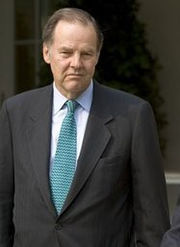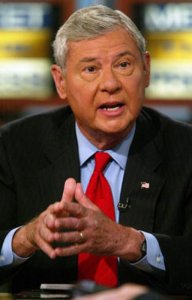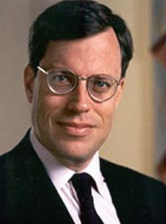By Brian P. McGlinchey

With the campaign to declassify 28 pages from a congressional inquiry moving ever closer to its goal, the chairmen and executive director of the 9/11 Commission are doing their best to discount the significance of the pages, which are said to illustrate damning ties between Saudi Arabia and 9/11.
In interviews, a formal statement and an op-ed piece, the three have cast doubt on the contents of the final, 28-page chapter of a 2002 congressional report.
Their aspersions can be reduced to two propositions:
- Comparable to “preliminary police notes,” the 28 pages are a collection of “raw, unvetted material,” and were rendered obsolete after the 9/11 Commission fully investigated those and other leads and issued its own final conclusions.
- Releasing the 28 pages in full could cast a shadow of guilt on individuals who, via the 9/11 Commission’s investigation, were later deemed innocent.
As citizens and journalists weigh the commentary of commission chairmen Tom Kean and Lee Hamilton and executive director Philip Zelikow, they should consider the possibility that members of the Saudi royal family aren’t the only ones whose reputations may be harmed by the release of the pages: To the extent that the release of the 28 pages undermines the conclusions of the 9/11 Commission, Kean, Hamilton and Zelikow may have an interest in minimizing their significance.
Before we proceed, note the 28 pages are not in the 9/11 Commission Report—they’re in the report of a joint congressional intelligence inquiry that preceded the commission.
Conflicting Justifications for Secrecy
There’s a glaring disconnect between the rationale for the redaction of the 28 pages advanced by Zelikow, Kean and Hamilton and the one offered by President George W. Bush when he classified them. While the three commission leaders argue that secrecy was warranted because the material was unvetted and hence unreliable, Bush said classification was necessary to protect intelligence “sources and methods.”
Republican Porter Goss, who co-chaired the joint inquiry and supports the release of the pages, likewise struck national security chords in 2003 as he tried to put the best face on Bush’s decision, saying nothing to question the reliability of the information that was concealed.
Speaking broadly of the need to keep some information in the 838-page report secret, Goss said, “You have to remember we are at war and there are some actionable items still being pursued by the appropriate authorities.” Then, apparently referring to the 28 pages, he said, “You’ll find there’s a couple of blank pages…as soon as the actions that are necessary to deal with those issues are completed, those pages will be filled out.” Not revised, corrected or repudiated after vetting. “Filled out” after action is taken.

On Sunday’s Meet the Press, former Senator Bob Graham, who co-chaired the joint inquiry, flatly refuted the idea that the 28 pages are raw, unvetted material.
Asked if it’s correct to compare the 28 pages to leads in an initial police report, Graham replied, “No. This report was 850 pages. This is 28 pages out of that. There’s been no questions raised about the professionalism and quality of the other 820 pages of that report and this chapter followed the same standards that they did.”
Serious Doubts About Thoroughness of Commission
In their Friday statement, Kean and Hamilton remind us that the commission—as controversially stated on page 171 of its report—“found no evidence that the Saudi government as an institution or senior Saudi officials individually funded” al Qaeda.
That assertion raises a question that goes to the heart of the 28 pages controversy, a question that could threaten the reputations of Kean, Hamilton and Zelikow: Just how thoroughly did the 9/11 Commission pursue leads both inside and outside the 28 pages that point toward Riyadh?

Though it may come as a surprise to journalists who are reporting the trio’s criticism of the 28 pages without scrutinizing much less acknowledging their potential conflicts of interest, there are many reasons to doubt that the probe of Saudi links was pursued with the vigor that 9/11 victims and the American people deserved.
That doubt specifically springs from Hamilton and Kean’s lack of investigative assertiveness in the face of Bush administration obstructionism, and the manner in which executive director Zelikow ran the inquiry.
- Commission member and former senator Bob Kerrey, in a statement submitted in the 9/11 victims’ suit against Saudi Arabia, said “evidence relating to the plausible involvement of possible Saudi government agents in the September 11th attacks has never been fully pursued.”
- As Philip Shenon recounted in The Commission, 9/11 commission member and former Navy secretary John Lehman “was struck by the determination of the Bush White House to try to hide any evidence of the relationship between the Saudis and al-Qaeda. ‘They were refusing to declassify anything having to do with Saudi Arabia,’ Lehman said. ‘Anything having to do with the Saudis, for some reason, it had this very special sensitivity.'”
- Kean and Hamilton, against advice from commission member and former deputy attorney general Jamie Gorelick, ruled out the routine use of subpoenas to compel full cooperation by various parts of the government, including the White House.
- Bush had a close personal relationship with Prince Bandar bin Sultan, the Saudi ambassador to the United States. Investigators learned Bandar’s wife wrote checks worth tens of thousands of dollars that eventually found their way to the wife of Omar al-Bayoumi, who is widely suspected of being a Saudi government operative. Bayoumi helped two future 9/11 hijackers find lodging and provided ongoing assistance to them. (With an admitted air of speculation, note that Lehman told 60 Minutes the 28 pages not only named names, but that “the average intelligent viewer of 60 Minutes would recognize them instantly.”)
- The commission bent to the White House’s controversial demands that Bush and Vice President Dick Cheney only be interviewed by a limited number of commission members, in private at the White House, with no recording or transcription of the conversation. Kean and Hamilton also conceded to the extraordinary White House stipulation that Bush and Cheney were to be interviewed simultaneously, as a team.
- Commission member Slade Gorton said the questioners, apparently mesmerized by the Oval Office environment, went easy on Bush and Cheney: “Several of my colleagues were not nearly as tough in the White House as they were when they went in.” Lehman asked Bush about the money transfers from Bandar’s wife to the wife of the alleged hijacker-handler in San Diego. “He dodged the questions,” said Lehman.
- Zelikow had close ties to the Bush administration: He co-authored a book with Condoleezza Rice, worked on the transition team and commission staffers were alarmed to learn, against policy, he had ongoing contacts with Bush political advisor Karl Rove during the investigation. The first public witness Zelikow called was an individual with no special expertise on 9/11 who used the opportunity to endorse the U.S. invasion of Iraq that had commenced the week before.
- Mike Jacobson and Dana Lesemann wrote the 28 pages for the congressional inquiry and also worked for the commission. When they set out to further their investigation of Saudi links, they compiled a list of 20 individuals they wanted to interview. Zelikow declared 20 was too many, and directed them to pick just 10, going against basic investigative principles that suggest casting as wide an initial net as possible.
- After repeatedly asking Zelikow for access to the 28 pages without effect, Lesemann, fed up, went around him to gain access on her own; when Zelikow found out, he fired her.
- With the commission’s final report nearly complete, Jacobsen was alarmed by a midnight call tipping him off that Zelikow and commission investigator Dieter Snell were rewriting findings that dealt with Saudi Arabia. As Shenon wrote, they removed “virtually all of the most serious allegations against the Saudis” and shifted important information into the footnotes. Members of the investigative team felt the excessive standard of proof demanded by Snell would effectively exonerate the guilty.
- Rep. Walter Jones read the 28 pages and is championing their release. Asked last week if the government derailed the investigation to protect Bandar and other VIPs, Jones said, “Things that should have been done at the time were not done. I’m trying to give you an answer without being too explicit.”
New Indications of Political Influence on Saudi Investigation
Last week, 28Pages.org broke news by drawing to public notice a recently declassified 9/11 Commission document. While its revelation of a mysterious Saudi embassy envelope made headlines around the world, another revelation has thus far flown largely under the media radar: Jacobson and Lesemann, at the outset of their commission work, questioned the aggressiveness of the investigation of links between the 9/11 attacks and the Saudi Arabia, and wanted to probe the extent to which “political, economic and other influences” had affected that line of inquiry.
As we wrote last week:
Organizationally set apart from dozens of other questions as among the more important, overarching lines of inquiry for their particular avenue of the commission’s work, the significance of the questions’ presence in Document 17 is amplified by the absence of corresponding answers in the commission’s final report.
At some point—perhaps after Lesemann’s determined interest in Saudi links to 9/11 led to her dismissal—someone apparently determined a public study of those critical questions was beyond the scope of work.
Between facts old and new, there seems ample reason to place an asterisk after the 9/11 Commission’s declaration that it found no links between the Saudi government and the al Qaeda hijackers. With an eye on the commission’s dubious investigatory approach and stark indications of political influence and White House obstruction, informed citizens and journalists want to know: Just how hard did the commission really look?
As Kean, Hamilton and Zelikow continue their campaign against the credibility of the 28 pages, the world awaits the journalist who will ask them that.
Our gratitude to 9/11 justice advocate Jon Gold for his collections of many facts cited above
